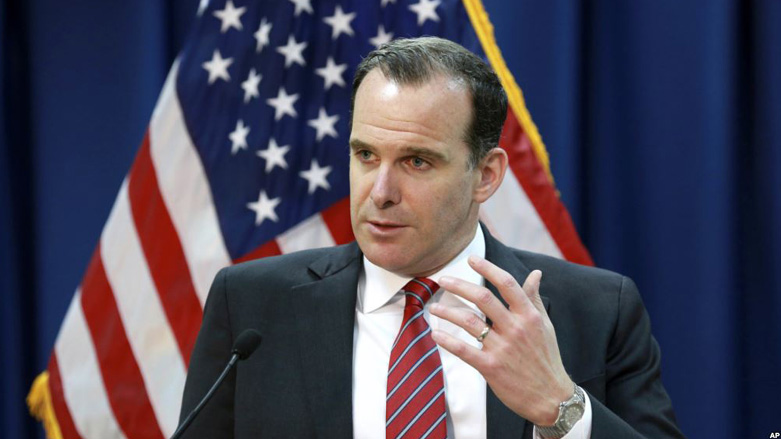McGurk’s future in Middle East unclear

WASHINGTON DC, United States (Kurdistan 24) – Foreign Policy magazine reported late on Thursday that the job held by Brett McGurk—Special Presidential Envoy (SPE) for the Global Coalition to Counter [the Islamic State (IS)]—is to be eliminated.
“The Trump administration plans to scrap the post,” the well-regarded journal reported. An hour later, however, State Department Spokesperson Heather Nauert tweeted a denial.
“Let me be clear,” she stated, McGurk “isn’t going anywhere.” He continues to serve in his position.
Foreign Policy based its report on “Congressional aides with knowledge” of the State Department’s plans and attributed the change to two factors.
First, the US-led coalition is well on its way to defeating IS militarily as an organization that controls territory.
Secondly, Secretary of State Rex Tillerson’s reorganization of the department includes eliminating such positions and otherwise trimming redundant and superfluous personnel.
McGurk is a lawyer by training, whose experience of the Middle East began only in 2004 as legal counsel to Paul Bremer, head of the Coalition Provision Authority. Bremer’s short tenure is widely regarded as an exercise in mismanagement that helped pave the way for the insurgency that was to ravage Iraq.
An adept bureaucratic player, McGurk moved seamlessly into the new Democratic administration, after Barack Obama won the 2008 presidential elections, assuming various positions dealing with the Middle East. In the fall of 2015, he became SPE to the anti-IS coalition, when Gen. John Allen stepped down from that post.
As the Trump administration took office, McGurk was slated to be replaced. The position was originally held by a high-ranking military officer, and another was to step in: Gen. H.R. McMaster.
However, just before that was to happen, Gen. Michael Flynn, Trump’s first National Security Adviser, was obliged to resign, as an informed source explained. McMaster was appointed in his stead, and McGurk retained his position.
During his years working on Iraq, McGurk has acquired a reputation as pro-Shia and even pro-Dawa, the Islamic party to which former Prime Minister Nouri al-Maliki and the current Prime Minister, Haider al-Abadi, both belong.
A pro-Shia position was consistent with the Obama administration’s conciliatory approach toward Tehran. However, it is diametrically opposed to the tough line that the Trump administration has taken toward Iran.
That issue came to a head in Oct. 2017, when Iraqi forces, along with Iranian-backed militias, attacked the city of Kirkuk, then under Kurdish control, in a military operation directed by Gen. Qassim Soleimani, head of the Quds Force of Iran’s Islamic Revolutionary Guard Corps—which the Trump administration had just designated a terrorist organization.
Rather than oppose the assault, the US turned a blind eye. McGurk had misled the White House on Iran’s central role in the attack, Kurdistan 24 was reliably told.
Rep. Duncan Hunter (R-California) publicly lambasted McGurk for the massive US misstep. The issue “needs to be elevated out of this one person’s hands in the State Department,” Hunter complained in a Capitol Hill press conference.
Although McGurk’s original brief was the anti-IS coalition, he has expanded that writ to include the future of Iraq, and to some extent, Syria. He has been able to do so because of the lack of appointments in the upper ranks of the State Department.
To this day, there is no permanent Assistant Secretary of State for Near Eastern Affairs, although David Schenker reportedly is slated for that position.
There is a big difference in understanding a region from the perspective of a lawyer who held senior government positions, and a person who has learned about the region from the bottom up—including culture, language, history, as one studies early in such a career.
Without such training, one may lack the understanding necessary to make prudent judgments. Those more experienced with the Middle East, like Ryan Crocker, who served as US ambassador to Iraq and Afghanistan, had a very different approach to the Kurdish issue in Iraq and the independence referendum.
Shortly after the referendum, but well before Iraq’s assault on Kirkuk, Crocker complained publicly that the US had made a “mistake” in criticizing the vote so strongly when it was clear that it was going to be held.
The criticism “may have emboldened Baghdad to take a harsher posture than it otherwise would [have],” Crocker suggested in late September.
Some months ago, this reporter complained to a Turkish journalist that McGurk seemed to think that he could micro-manage the region: tell this to do that and that to do this to suit whatever the US wished. He readily agreed.
Compared to the US, these are not major powers, but the region is possessed of strong passions. At best, one might hope to steer them and shape them for the better, but one cannot dictate their direction—make the lion lie down with the lamb because it suits you.
Perhaps, there is a growing realization of that. Turkey may be another reason why it was reported at this time that McGurk’s position is to be eliminated.
Turkey blames McGurk for the US alliance with the Kurdish People’s Protection Units (YPG) in Syria—a major issue between Ankara and Washington. Perhaps, someone with a better sense of the region’s politics—and respect for its people—might have done more to find some sort of compromise that would have avoided the current bloodshed.
Or, perhaps, that would not have been possible. But in any case, since Tillerson’s visit to Ankara last week and his long tete-a-tete with President Recep Tayyip Erdogan, the US has resolved on ending the crisis in relations with Turkey. Eliminating McGurk’s position would be an easy sop to Ankara.
Editing by Nadia Riva
